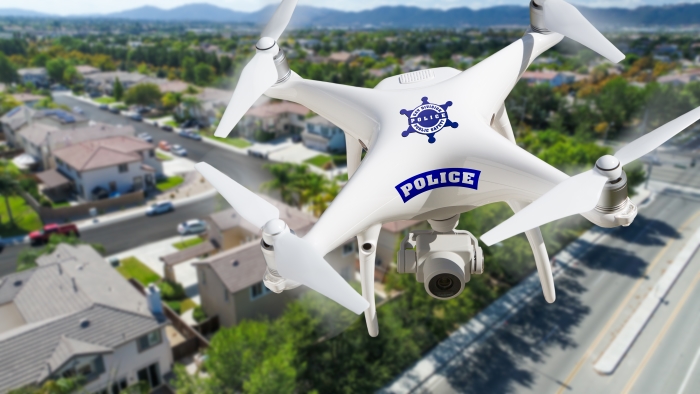A survey of police forces on their use of drones has raised concerns about the resilience of software, data security and scrutiny of processes, according to the biometrics and surveillance camera commissioner.
Professor Fraser Sampson has highlighted the issues along with the publication of the results of the survey, which received responses from 36 of the UK’s 47 police forces. Three of the 36 said they did not operate drones.
Uncrewed aerial vehicles (UAVs), as they are also known, are now widely used by police, often being equipped with high definition cameras with night vision or thermal imaging capabilities. Some also record sound.
Among the findings of the survey is that 62% of forces stated they used a standalone device to control their UAVs, and the most common protocol in place to protect against data breaches is the use of an SD card to extract footage (62% of responses) which is wiped afterwards. Only 18% stated they used encryption or downloaded the footage behind a firewall.

Meanwhile, only three forces specifically mentioned adhering to the Home Office Surveillance Camera Code of Practice – while two said they have not considered any protocols.
Mitigating risks
When asked what procedures they had in place to mitigate security risks when updating their UAVs, 54% said it was never done on a police network but via a standalone laptop or independent Wi-Fi connection. 35% did not explain how their systems are kept up-to-date.
These have led to a number of concerns, including that there is a lack of awareness of the risks to data security when drones are deployed, and of those associated with supplying software updates to the UAV systems.
There is also a lack of consistency in how police use of drones is scrutinised to ensure it is appropriate and ethical, with several forces having no external scrutiny mechanism, and others using a variety of outside bodies including the commissioner’s office and the Civil Aviation Authority.
In response, Sampson has made four main recommendations. First is that guidance should be available to forces on the procurement and deployment of surveillance technology from companies whose trading history and engagement with accountability frameworks has raised concerns.
Second is the need for guidance on how to mitigate security risks specific to UAVs, such as hacking and the use of counter-UAV technology. Third is that chief officers should seek a single approach from local elected policing bodies to ensure they have mechanisms to hold them to account and that the procurement and deployment of the technology is ethical.
Fourth, they should also consider a standardised procedure for assessing sensitivity in the use of drones, whether it relates to a geographical site of a more transient operation.
Need for good practice

Sampson commented: “There is no doubt that drones can be a useful tool in police efforts to detect and deter crime. Modern drones are small, stealthy and highly capable information gathering tools that can reach places that officers and other equipment cannot.
“But like any potentially intrusive technology that can be used to watch and collect information about people, there must be consistent good practice, sensible controls, and ethical oversight in relation to how they are used.
“Our survey showed that practice among police forces in England and Wales is patchy at best, and that there is a clear need for coherent consistent guidance to be provided.
“The use of drones in policing will only expand in the years to come so now is the time to put some sensible practical guidance in place. I have made a series of recommendations. It is not rocket science, but if implemented they should at least put drone usage by police forces in England and Wales on a firmer footing.”
(Source: UKAuthority)










